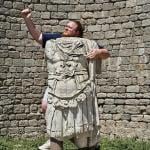One Sunday a few years ago, my husband and I, traveling in San Francisco, found ourselves in a church that insisted on praying a certain phrase from the Lord’s Prayer as “thy kin-dom come.” “Kingdom,” apparently, was too hierarchical, not to mention patriarchal, so a nice, equalizing, friendly word became the substitute metaphor. Fortunately, I haven’t encountered again the particular abomination of “kin-dom,” but I think it’s fair to say that the substitution represents a larger cultural trend. We Americans, unlike the Israelites in the latter days of the judges, are mistrustful of kings. So why does NBC’s new TV series Kings, a modern-day retelling of the saga of Saul and David, keep the royal metaphor while updating other biblical motifs?
Kingship definitely still speaks to us, if only in negative connotations—excess, abuse of power—and these are the very characteristics Kings wants to emphasize in its Saul figure, Silas Benjamin. Silas may have been chosen by God in the beginning: he repeatedly tells the tale of how a flock of butterflies landed on his head, forming a living crown, indicating his favor with God. The biblical Saul, too, was chosen by God, but only as a concession to the Israelites’ demands for a king, demands driven by fear and envy of other nations. The prophet Samuel, at the Lord’s command, warns the people that the king will oppress them, taking the best of their land and labor for himself: “you will cry out because of your king, whom you have chosen for yourselves, but the LORD will not answer you in that day” ( 1 Samuel 8:18). And yet—this is the part that strikes awe in me—God not only gives the people the king they have asked for, but continues to invite them to use the metaphor of kingship for God himself. Even metaphors that we’ve cracked and corrupted can continue to reveal something of God to us.
In Kings, the narrative begins after Saul/Silas has already become king: these days, we need no warnings about kings and their evil ways. The very fact that Silas refers to himself as “king” and not “president” or “prime minister” is enough to make us distrust his regime. It’s not a surprise that he orders a dissenting cabinet member killed (if the series doesn’t make it up to David’s assassination of Uriah the Hittite, at least we have some nice foreshadowing here) or that he takes some other sneaky actions to justify military offensives against Gath. What’s interesting, though, is that the show’s creators didn’t make Silas a CEO of a multinational corporation, a role that communicates corruption to us even more than a king. There is a CEO in the show: Silas’s brother-in-law is the CEO of Halliburton—ahem, I mean “Crossgen”—a weapons company intent upon keeping the war with Gath going as long as possible. Making Crossgen the real villain of the show creates some sympathy for Silas—as does Ian McShane’s acting, which is without question the best in the show. Is it possible that we might see some of the appealing aspects of the king metaphor, too?
On the other hand, our protagonist David isn’t actually a shepherd, though his last name is Shepherd (and he plays fetch with an Australian shepherd dog in the first scene). Today’s David is not a guardian who keeps his sheep safe; instead, he’s a mechanic. The frequency with which characters in the show remind us that David is “good at fixing things” (a car, a watch, the nation) suggests that we’re being invited to think of his literal profession as having the same symbolic significance that shepherding did for an agricultural society. Today, we don’t feel the need for protection as much; instead, we have a sense that things in the world are broken and need repair. We expect leaders to fix things.
The show runs into a little more difficulty with how to transpose a prophet-priest-judge-kingmaker into the modern day. Samuel, here Reverend Samuels, is relegated to something like a religious advisor who “swears in” the king and occasionally declares the will of the Lord. Reverend Samuels does all the things that Samuel does, but without quite the gravity and authority that went with those roles in the Bible. This isn’t a critique of the actor, Eamonn Walker, who does a fine job, but rather a realization that Samuel’s role is even harder than the king’s for Americans, especially American Protestants, to understand. Billy Graham is important and influential and all-around saintly guy, but we don’t see him as God’s representative here on earth. Is there a role, or a combination of roles, that even hints at all the divinely granted authority vested in the biblical Samuel?
Overall, though the show definitely has its strengths and weaknesses, I’m impressed by the effort to find modern-day equivalents that carry not only the literal but also the symbolic significance of biblical figures. (I’m only addressing here the characters whose roles are also ascribed to God in the Bible; don’t get me started on how the idea to update Goliath to an armored tank completely fails.) “Kin-dom” aside, I do have sympathy for people to whom biblical metaphors say little—or for whom those metaphors are primarily negative. While I do think that the metaphors we use in church services should be primarily drawn from the Bible, we also have the God-given freedom to use our creativity to supplement biblical metaphors with images that speak to our cultural and personal circumstances. At its best, this is what Kings does, and this is why I hope it survives.
(By the way, Hulu has the premiere of Kings available for free viewing.)











